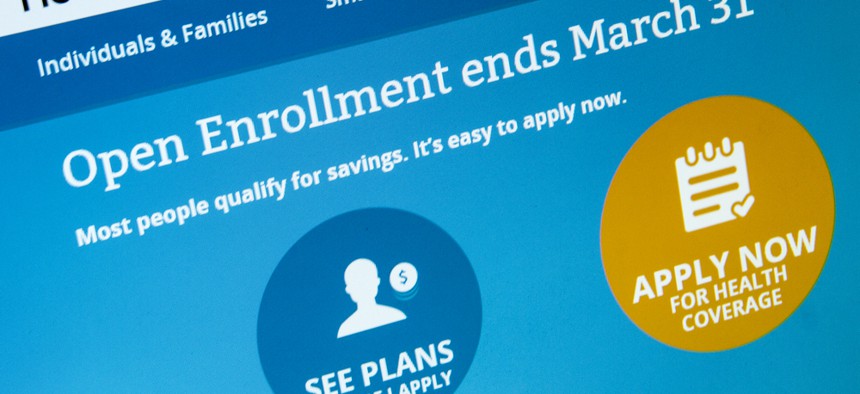
txking / Shutterstock.com file photo
If Cruz Is ‘on Obamacare,’ So Are His 2016 Rivals
Ted Cruz is not the first Republican to get covered through the exchanges—which was a Republican’s mandate.
Yes, Ted Cruz can buy insurance through Obamacare while remaining totally committed to repealing it. Just like his competitors for the 2016 presidential nomination.
Cruz said Tuesday that he and his family will sign up for health insurance through the exchanges created by Obamacare, prompting plenty of ridicule from Democrats looking to paint Cruz—a staunch opponent of the health care law—as a hypocrite.
But Cruz isn't the only 2016 contender to turn to the exchanges. Sen. Rand Paul signed up when the marketplaces first opened. "It made me an unhappy person," he said at the time.
Sen. Marco Rubio also signed up for coverage through Obamacare's exchange. So did Rep. Paul Ryan. In fact, most members of Congress—yes, including the Republicans who have vowed and voted so many times to repeal the Affordable Care Act—use the exchanges.
So, why are so many of Obamacare's critics covered through Obamacare? Some critics have called Cruz a hypocrite for "going on Obamacare" while continuing to beat the drum for repeal. But Cruz and other Republicans aren't secretly starting to like Obamacare—they've simply backed themselves into a corner where the exchanges are the most rational choice.
"Senator Rubio is following the law, even though he opposes it," a spokeswoman told the Tampa Bay Times when he first signed up.
First of all, let's be clear that Cruz is not "on Obamacare." There is no such thing as being "on Obamacare." It's not an insurance plan, or a single program like Medicare or Social Security. Cruz, Rubio, Ryan, Paul, and the 11.7 million other Americans who have used the exchanges are all on private insurance plans, and there are hundreds of them to choose from.
But that's about where the similarities end. Cruz—and Rubio and Ryan and all the rest of lawmakers in the exchanges—aren't really using Obamacare for any of the reasons it exists, or in the same way the other 11-odd million enrollees are.
Most Americans, about 60 percent, get insurance through their jobs. The exchanges are there for people who don't, and therefore have to buy it on their own.
The Cruz family was among the 60 percent of people who get insurance through work. They used to covered by the plan offered by Heidi Cruz's company, Goldman Sachs. But she is taking an unpaid leave for the presidential campaign, so they're switching to the coverage offered by Ted Cruz's employer—the federal government.
And if members of Congress want to get health insurance from their employer, the Obamacare exchange in D.C. is the first place to go.
Members of Congress used to get their health insurance just like any other federal employees, but Obamacare changed that. An amendment from Republican Sen. Charles Grassley kicked lawmakers and their staffers out of the exchange for federal employees; instead, they would have to use an Obamacare exchange. The government can still cover a portion of their premiums, just as almost all large employers do for their employees.
If he really wants to make a point, Cruz can go outside the exchange. But he probably would be purchasing roughly the same coverage—maybe even the exact same policy, just using a more cumbersome shopping process.
The biggest reason for lawmakers to use the exchanges, though, is so the government will be able to make its contribution to their premiums. Cruz has said he will forgo that subsidy, which would have covered more than 70 percent of his family's premiums.
The subsidy that Cruz passed up—but that other lawmakers are receiving—is not from Obamacare. It's from his job, and it's very common. Americans who have employer-based insurance (remember, that's about 60 percent of the country) get, on average, 70 to 80 percent of their premiums paid by their employers, according to the Kaiser Family Foundation.
So, sure, Ted Cruz might go into the exchanges. With most members of Congress. And even if he had taken the government's contribution, that would have been a standard workplace benefit unconnected to the Affordable Care Act.
This whole process is an aberration. It's not an extension of how Obamacare works or what Obamacare does.
Congress shoehorned itself into the exchanges to make a political point ("what's good enough for our constituents is good enough for us"). The Obamacare safety net is not catching Ted Cruz, nor is he surreptitiously hoarding the particular benefits he wants to take away from other people. This is just the awkward process that Congress decided on.
The exchanges are there for small businesses and people who don't get coverage through their jobs at all. It might not make a ton of sense that Congress tossed a small sliver of federal employees—people who work for the largest employer in the country, and who have health benefits—into a market for small businesses and the uninsured.
But it also doesn't make a ton of sense to argue that if Ted Cruz hates Obamacare so much, he should prove it by renouncing standard, non-Obamacare health care benefits that most Americans receive. Which is why his Republican colleagues haven't done so, either.






